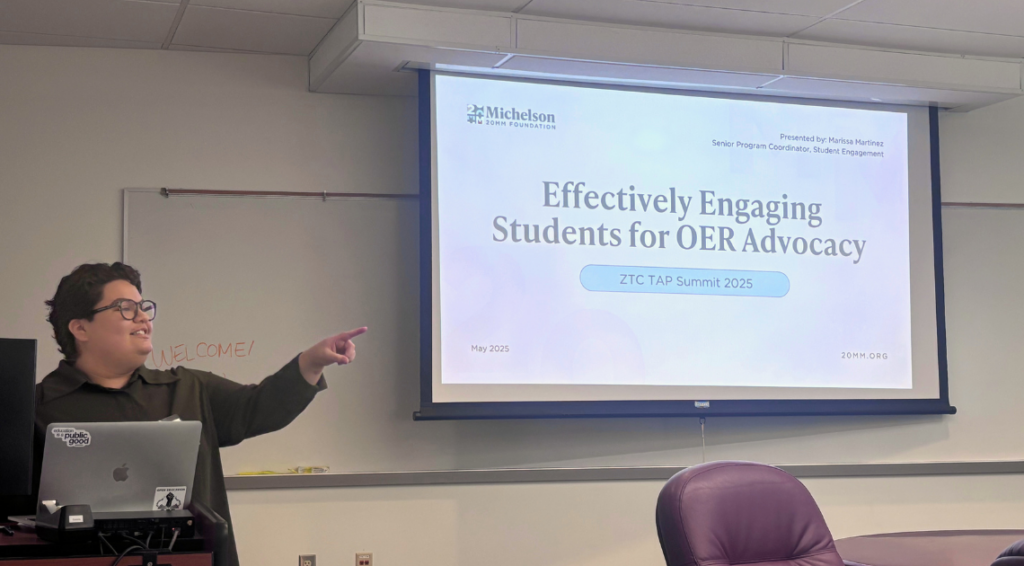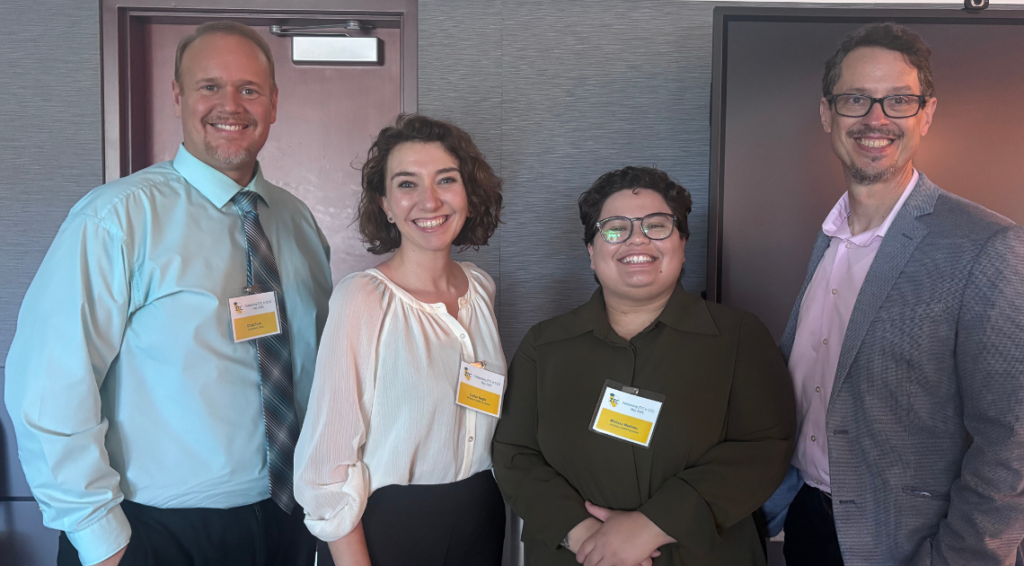News and Announcements
Inside the ZTC Summit: Building Affordable Pathways in CCCs
Published Date
- May 27, 2025

By Cailyn Nagle and Marissa Martinez
Earlier this month, the Michelson 20MM Foundation joined faculty, administrators and researchers at the Zero-Textbook Cost (ZTC) Degree summit hosted by College of the Canyons. Over a hundred ZTC and OER practitioners gathered to learn about efforts to lower course material costs in California Community Colleges (CCC).
A Statewide Commitment to Affordability
In 2021, Governor Newsom allocated $115 million to fund the current ZTC Degree program, the largest single investment in course material affordability nationally. “ZTC Degrees” are degree programs composed entirely of courses that eliminate textbook costs by using high-quality, no-cost content, with an emphasis on OER. The program builds on a 2016 pilot that created 33 ZTC Degrees and Career Technical Education certificates at 23 CCCs, saving students $7 for every $1 invested.
Celebrating Progress and Looking Ahead
The morning kicked off with welcoming remarks from Hildegarde B. Aguinaldo, president of the CCC Board of Governors, and David Andrus, interim president of the College of the Canyons.
Following the welcome, the Office of the Chancellor’s update provided a lot of news worth celebrating! They shared that the program has successfully allocated the majority of their funding and that 379 ZTC pathways will be available across the system by this fall’s term. The positive impact this has on accessibility across the system will be immediately felt by students. These programs will launch this fall, with even more ZTC degrees under development. After hearing such inspiring progress, the event split into breakout sessions on topics like AI in OER, ZTC and general education, and OER and ZTC Advocacy.

“Effective Approaches to Engaging Students in OER/ZTC Efforts,” a session led by Marissa, was filled with campus faculty, librarians, and administrators. They were eager to learn more about how they could best engage students to support OER and ZTC advocacy. The presentation encouraged participants to use an advocacy framework when thinking about ways to partner with students for their OER projects.
Each session group discussed their project goals, strategies, and tactics to understand where students can most effectively support their OER and ZTC efforts. Participants learned about some of the tactics student-leadership can use to further the goals of their campaigns like writing resolutions or hosting on-campus events. By the end of the sessions, attendees were left with a campus-specific OER/ZTC advocacy strategy, a strategic understanding of the role students play as partners in the work, and the tactics students can use to push the needle forward on OER adoption and ZTC degree implementation.
Faculty Leadership and Systemwide Momentum
Michelle Pilati, Psychology Professor at RioHondo College and Project Director of the Academic Senate’s Open Educational Resource Initiative (OERI), led the keynote session. She outlined the fantastic work faculty have done across the state, from curating OER collections to supporting OER liaisons across colleges. OERI plans to continue supporting OER development, cross-discipline sessions, and provide professional development opportunities for CCC educators. They will also continue to advocate for and support the implementation of open course materials across the system for at least another decade.
Innovative Tools and Local Success Stories
The day wrapped up with individual colleges digging into their local success stories, projects, and research, including Michelson 20MM Spark Grant recipients from Chabot College. Colleges like Coalinga, Diablo Valley, Leemore, and Mira Costa Colleges shared more about the strategies they have taken locally to build successful ZTC programs. This includes focusing on full-time faculty outreach as a point of programmatic sustainability to evaluating the negative impacts high textbook costs have on students.
Chabot College gave an in-depth preview of the interactive data dashboard built over the last year. Nine colleges are currently piloting the dashboard, which helps ZTC programs to identify gaps in their pathways, track impacts on students, and more. The room was buzzing with excitement as Dr. Alexander Karan, who played a large role in building the system, gave a tour of the program. It’s rare to get “oohs and aahs” from an audience looking at graphs, but the Chabot team certainly earned and received them.
A Call to Keep Building
It is not easy to build something as large, interconnected, and visionary as Zero Textbook Cost Degrees, but educators across California are doing just that. Librarians, administrators, instructors, researchers and others will continue the hard work of lowering costs for students and increasing access to course materials. The State of California must rally behind those who are rolling up their sleeves to support students throughout this system and beyond. We must support those who are building a higher education system that reflects the equity and opportunity our state deserves.
About the Michelson 20MM Foundation
Michelson 20MM is a private, nonprofit foundation working toward equity for underserved and historically underrepresented communities by expanding access to educational and employment opportunities, increasing affordability of educational programs, and ensuring the necessary supports are in place for individuals to thrive. To do so, we work in the following verticals: Digital Equity, Intellectual Property, Smart Justice, Student Basic Needs, and Open Educational Resources (OER). Co-chaired and funded by Alya and Gary Michelson, Michelson 20MM is part of the Michelson Philanthropies network of foundations.